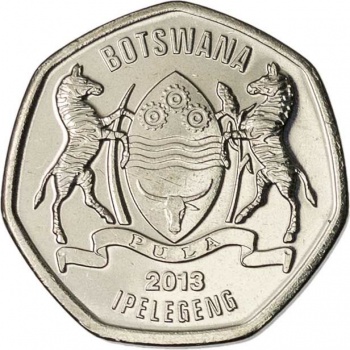National Arms of Botswana: Difference between revisions
Knorrepoes (talk | contribs) No edit summary |
Knorrepoes (talk | contribs) m (Text replacement - "|Arms of {{PAGENAME}}]]" to "|Coat of arms (crest) of {{PAGENAME}}]]") |
||
| (One intermediate revision by the same user not shown) | |||
| Line 3: | Line 3: | ||
'''National Arms of Botswana''' | '''National Arms of Botswana''' | ||
[[File:Botswana.jpg|center| | [[File:Botswana.jpg|center|Coat of arms (crest) of {{PAGENAME}}]] | ||
===Official blazon=== | ===Official blazon=== | ||
Argent three barrulets wavy in fesse Botswana blue between in chief three Botswana blue cogwheels, one above engaged with two below and in base a brown bull's head caboshed proper, and for the supporters on either side a zebra the dexter supporting a white elephant's tusk the sinister a green stalk of sorghum and brown sorghum head with white grains proper. Motto "Pula" in black on a Botswana blue half tone scroll. The reverse side of the scroll is red. | |||
===Origin/meaning=== | ===Origin/meaning=== | ||
| Line 17: | Line 18: | ||
{|align="center" | {|align="center" | ||
|align="center"|[[File:bw-c1.jpg|center|350 px| | |align="center"|[[File:bw-c1.jpg|center|350 px|Coat of arms (crest) of {{PAGENAME}}]] <br/>The arms on a coin | ||
|} | |} | ||
Latest revision as of 14:41, 20 August 2023
National Arms of Botswana
Official blazon
Argent three barrulets wavy in fesse Botswana blue between in chief three Botswana blue cogwheels, one above engaged with two below and in base a brown bull's head caboshed proper, and for the supporters on either side a zebra the dexter supporting a white elephant's tusk the sinister a green stalk of sorghum and brown sorghum head with white grains proper. Motto "Pula" in black on a Botswana blue half tone scroll. The reverse side of the scroll is red.
Origin/meaning
The above arms were adopted on January 25, 1966.
The shape of the shield is rather strange, as it is a shape used by many tribes in the eastern part of Africa (Kenya, Tanzania), and also in the eastern part of South Africa but not by the Tswana tribes in Botswana. The cog wheels symbolise mining and industry in the country. The waves symbolise the (few) rivers in the country, and the importance of water. The bull's head symbolises the importance of cattle herding for the economy of the country.
The supporters are two zebra (Equus zebra), which are common among the wildlife in Botswana. The supporters hold an elephant's tusk, as a symbol for the former ivory trade, and an ear of sorghum (millet, Sorghum bicolour), the main local crop.
The motto Pula means Rain, indicating the importance of rain (and water) for the country. It is also used as a normal greeting in the country.
| The arms on a coin |
Contact and Support
Partners:
Your logo here ?
Contact us
© since 1995, Heraldry of the World, Ralf Hartemink 
Index of the site
Literature : Image taken frm Wikipedia, information taken from http://www.christian-siemer.de














